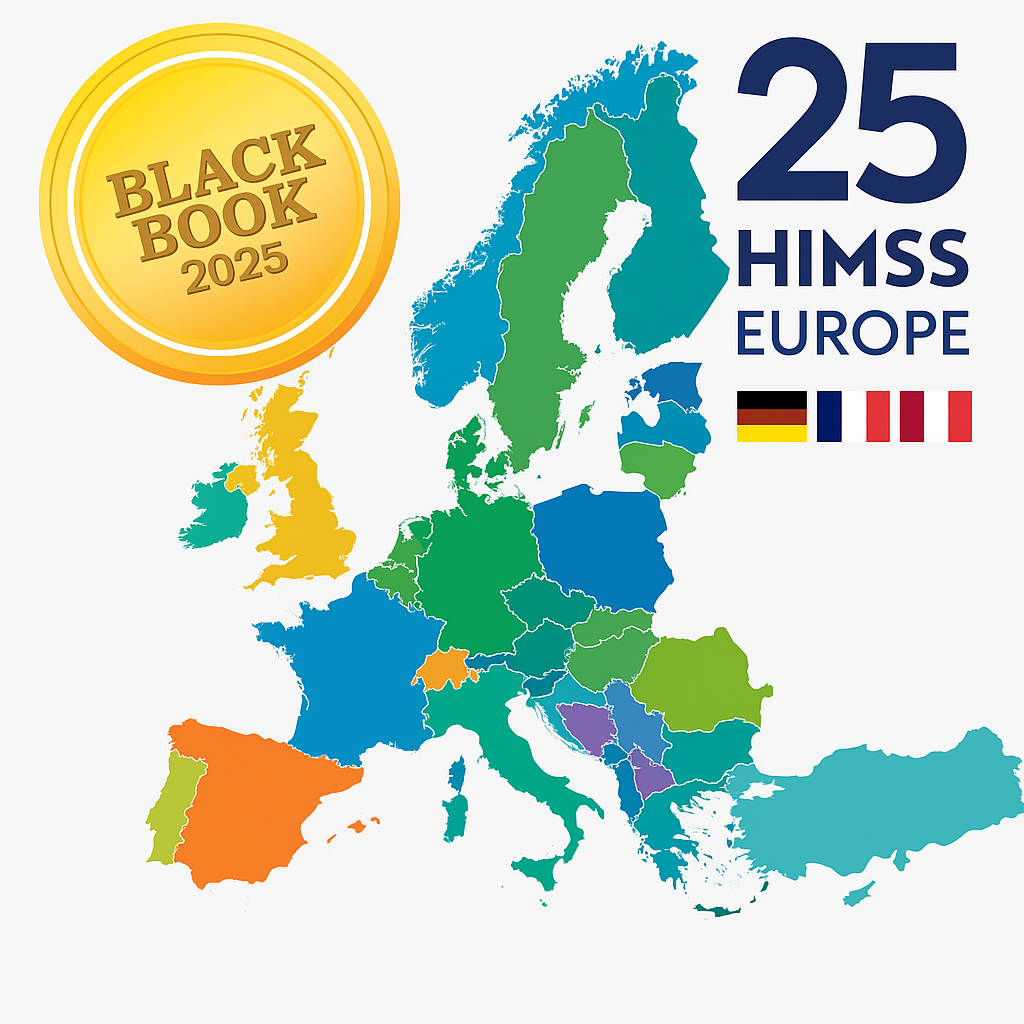Poll of 442 Healthcare Executives Highlights Four Key Workforce Issues Driving Adoption of AI, Virtual Care, and Automation Solutions Across 13 European Countries
LONDON, GB / ACCESS Newswire / June 5, 2025 / European hospitals and health systems are urgently adopting advanced technological solutions to mitigate severe workforce shortages, as revealed in a new survey by Black Book Research. Conducted ahead of the HIMSS25 European Health Conference & Exhibition in Paris (June 10-12), the survey identifies four major workforce challenges driving strategic shifts toward AI, virtual care, and automation.
1. Acute Nursing and Clinical Staff Shortages:
Germany: 90% of healthcare executives reported critical nursing shortages, accelerating investments in AI-powered scheduling and remote patient monitoring.
Spain: 73% emphasized significant shortages in nursing staff, prompting substantial adoption of automation technologies and digital scheduling.
Switzerland: 60% cited critical gaps in frontline clinical roles, driving expansions in telemedicine and remote healthcare solutions.
2. Specialist and Technician Deficits:
Italy: 75% highlighted severe specialist shortages, increasing deployment of virtual consultations and telemedicine.
Netherlands: 78% prioritized remote patient monitoring due to persistent clinical technician shortages.
Finland: 74% invested in remote diagnostic technologies to counteract widespread specialist shortages.
3. Staff Burnout and Operational Overload:
France: 82% identified staff burnout as their primary challenge, significantly increasing adoption of virtual nursing assistants and automated administrative tools.
Norway: 77% prioritized AI-driven administrative automation to alleviate clinician burnout and operational strain.
Belgium: 72% focused investments on AI-powered scheduling systems to effectively manage staffing demands and reduce burnout.
4. Administrative Burden and Efficiency Pressures:
United Kingdom: 78% actively evaluated AI-driven clinical decision support to reduce administrative workloads and enhance clinical efficiency.
Ireland: 72% urgently adopted digital triage and virtual care platforms to manage escalating demands on emergency departments.
Sweden: 69% accelerated digital transformation initiatives, especially telehealth platforms, to address rural clinician shortages.
Denmark: 68% increased digital health budgets aimed at virtual care to mitigate staffing challenges in chronic disease management.
"Europe's healthcare workforce crisis is compelling hospitals to quickly implement technological solutions," said Doug Brown, Founder of Black Book Research. "At HIMSS25 Europe, attendees will explore innovative digital strategies specifically designed to address critical staffing issues and strengthen healthcare delivery systems."
At HIMSS25 Europe several confirmed sponsors and partners are poised to address the pressing healthcare workforce challenges identified in the recent Black Book Research survey. These challenges include acute nursing and clinical staff shortages, specialist and technician deficits, staff burnout and operational overload, and administrative burden and efficiency pressures. The following vendors top-rated by European clients in 2025 polling by Black Book offer solutions aligned with these needs. Download the full updated Q2 Global Black Book of Healthcare IT Solutions at https://blackbookmarketresearch.com/register-for-the-black-book-of-global-healthcare-it-2025-report
Dedalus: A global health software company, Dedalus provides digital health solutions aimed at improving care delivery and operational efficiency, addressing various workforce challenges.
GE HealthCare: Offering advanced diagnostic imaging and monitoring solutions, GE HealthCare supports remote diagnostics and virtual care, alleviating specialist shortages and improving patient access.
InterSystems Corporation: InterSystems offers data management and interoperability solutions facilitating seamless information exchange across healthcare systems, helping reduce administrative burdens and improve clinical decision-making.
Microsoft Corporation: Microsoft provides cloud and AI solutions tailored for healthcare, including tools that support virtual care and administrative automation, helping address staff burnout and operational overload.
Oracle Health: Oracle Health offers comprehensive healthcare IT solutions, including EHR systems and data analytics tools, supporting administrative efficiency and enhancing clinical workflows.
Philips: Philips provides a range of healthcare technologies, including telehealth platforms and remote patient monitoring systems, instrumental in managing specialist and technician deficits.
Wolters Kluwer: Known for evidence-based clinical decision support tools, Wolters Kluwer offers solutions that can help reduce clinician burnout and improve operational efficiency.
Attendees are encouraged to engage with these exhibitors to explore technologies designed to enhance operational efficiency, support clinical staff, and improve patient care delivery across European healthcare systems. The HIMSS25 European Health Conference & Exhibition at the Palais des Congrès in Paris will feature extensive sessions and demonstrations focused on AI-driven healthcare automation, virtual care strategies, and practical, real-world case studies addressing these pressing workforce challenges. For more information about HIMSS25 Europe, visit: https://www.himss.org/events-overview/european-health-conference-and-exhibition
Media Contact: Black Book Research Email: Research@BlackBookMarketResearch.com
About Black Book Research: Black Book Research is an independent healthcare market research firm globally recognized for unbiased insights and strategic guidance driven by extensive survey data from healthcare leaders, providers, and policymakers. Read more at www.blackbookmarketresearch.com
Contact Information
Press Office
research@blackbookmarketresearch.com
8008637590
SOURCE: Black Book Research
View the original press release on ACCESS Newswire
